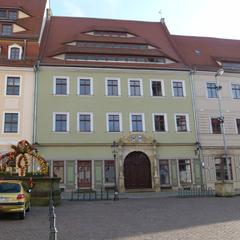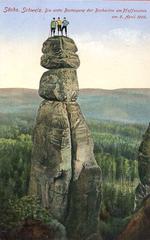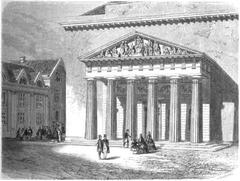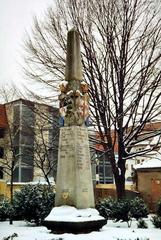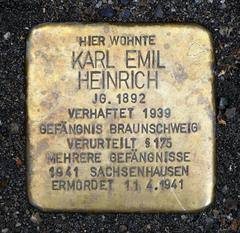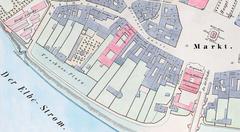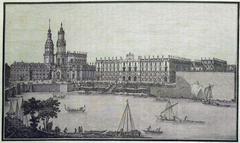Sonnenstein Castle: Visiting Hours, Tickets, and Historical Sites Guide – Pirna, Germany
Date: 15/06/2025
Introduction
Sonnenstein Castle (Schloss Sonnenstein) is one of Saxony’s most significant historical landmarks, perched atop a sandstone hill overlooking Pirna and the Elbe Valley. With roots dating back to the 13th century, the castle has witnessed dramatic transformations: from medieval fortress and Renaissance noble residence to pioneering psychiatric hospital, and later, a memorial site for victims of Nazi persecution. Today, it serves as a place of remembrance, education, and vibrant cultural life. This guide provides comprehensive details on Sonnenstein Castle’s visiting hours, ticketing, accessibility, guided tours, and the cultural and historical context that makes it a must-visit site in Pirna.
For further information, refer to official sources such as Pirna city history, Visit Dresden Elbland, and the Pirna Summer of Sculpture.
Table of Contents
- Introduction
- Early History and Architectural Development
- Psychiatric Institution and Medical Innovation
- Nazi Era and Memorialization
- Visiting Hours and Tickets
- Guided Tours and Events
- Accessibility and Visitor Amenities
- Getting to Sonnenstein Castle
- Architecture and Notable Features
- Cultural Significance and Memorial
- Pirna Summer of Sculpture
- Nearby Attractions
- Practical Tips for Visitors
- Accommodation and Dining
- FAQ
- Conclusion
- References
Early History and Architectural Development
Sonnenstein Castle’s origins trace back to the 13th century, strategically positioned to oversee and defend the Elbe Valley and vital trade routes (Pirna city history). Initially a military bastion under the Margraves of Meissen, its architecture reflected the Gothic style: thick defensive walls, pointed arches, ribbed vaults, and narrow windows for surveillance and protection (Map of Thrones).
In the 16th century, Duke George the Bearded of Saxony initiated a significant transformation, turning the fortress into a Renaissance palace with elegant facades, grand halls, and formal gardens. Later centuries introduced Baroque and 19th-century additions, including terraced gardens and bastions (Komoot).
Psychiatric Institution and Medical Innovation
In 1811, Sonnenstein Castle became one of Germany’s first modern psychiatric hospitals – the Sonnenstein Institution. Its progressive therapies and humane patient care attracted medical experts from across Europe, influencing psychiatric practice for generations. The facility included specialized wards, therapy rooms, and therapeutic gardens, accommodating hundreds of patients at its peak.
Nazi Era and Memorialization
During World War II, Sonnenstein Castle became a site of immense tragedy. Between 1940 and 1941, it was repurposed as a killing center under the Nazi “Aktion T4” program, where approximately 15,000 individuals with disabilities and concentration camp detainees were murdered (Komoot; Map of Thrones). Today, the Pirna-Sonnenstein Memorial occupies part of the castle, honoring victims and educating visitors about this dark chapter with exhibitions, personal stories, and guided tours.
Visiting Hours and Tickets
Regular Opening Hours
-
Memorial & Permanent Exhibition:
Tuesday to Sunday: 10:00 AM – 5:00 PM
Closed Mondays and public holidays (Stiftung Sächsische Gedenkstätten). -
Pirna Summer of Sculpture (May–September):
Wednesday to Sunday and holidays: 1:00 PM – 5:00 PM (Pirna Summer of Sculpture).
Admission
- Memorial Exhibition: Free
- Pirna Summer of Sculpture: Adults €6.00, reduced €4.00, children/youth under 18 free
- Guided Bastion Tours: Adults €6.00 (guest card holders €5.00), reduced €4.00, children/students free (Visit Dresden Elbland)
Tickets are available on-site; advance booking is recommended for group tours and special events.
Guided Tours and Events
- Public Guided Tours: Free every Saturday at 2:00 PM (German)
- Group Tours: Available in German or English by prior arrangement via phone or email (Stiftung Sächsische Gedenkstätten)
- Educational Workshops: Programs for schools and interested groups
- Annual Events: Pirna Summer of Sculpture, commemorative ceremonies, and scientific symposia
Accessibility and Visitor Amenities
- Wheelchair Access: The memorial and main castle grounds are partially accessible; some historic areas have stairs/uneven surfaces. Contact the site for details (Stiftung Sächsische Gedenkstätten).
- Restrooms: Located within the castle complex
- Museum Shop: Books, catalogues, and souvenirs available at the memorial center
- Parking: Limited, with designated spaces for disabled visitors
- Café/Refreshments: No café inside the castle; numerous dining options in Pirna’s old town nearby
Getting to Sonnenstein Castle
- By Car: Follow B172 into Pirna and exit at the Sonnenstein roundabout (“Landratsamt” exit); parking is available nearby (Pirna official tourism).
- On Foot: Walk from Pirna’s market square following “Malerweg/Festung Sonnenstein” signs up the Schlossberg staircase (Visit Dresden Elbland).
- Public Transport: Take regional trains/buses to Pirna; bus lines 241/246 stop at “Pirna Landratsamt,” 500 meters from the castle (Elbe/Labe Euroregion).
Architecture and Notable Features
- The White Tower: Landmark of the castle, showcasing medieval defensive design (Komoot)
- Bastions & Fortifications: 18th-century enhancements now restored for public exploration
- Terraced Gardens: 19th-century gardens offering scenic views and leisure walks (Komoot)
- Museum Spaces: Exhibitions in preserved chambers tell the story of the castle’s evolution (Map of Thrones)
Cultural Significance and Memorial
Sonnenstein Castle’s layered history is a microcosm of Saxony’s past. From seat of noble power to a site of tragedy and, finally, to a place of civic engagement and remembrance, the castle invites reflection and dialogue. The Pirna-Sonnenstein Memorial offers exhibitions, a memorial trail marked by colored crosses, and interpretive panels linking the town center to the castle.
Pirna Summer of Sculpture
Each year, the castle hosts the Pirna Summer of Sculpture, an acclaimed exhibition featuring contemporary German and Czech artists. The 2025 theme, “Resonance,” encourages dialogue between history and art. Exhibits are interactive, with workshops for families and schools. For details and the latest program, visit the official Sculpture Summer website.
Nearby Attractions
- Pirna Municipal Museum: 0.8 km
- GDR Museum Pirna: 2.0 km
- Miniature Park “Little Saxon Switzerland”: 4.0 km
- Botanical Collections Zuschendorf Castle: 4.0 km
- Gross-Sedlitz Baroque Garden: 4.4 km
- Richard Wagner Sites in Graupa: 4.6 km (Elbe/Labe Euroregion)
Pirna’s old town offers vibrant squares, Renaissance and Baroque architecture, and riverside promenades. Saxon Switzerland National Park is nearby for hiking and scenic tours.
Practical Tips for Visitors
- Best Visiting Times: May–October (Sculpture Summer), weekdays are less crowded
- Visit Duration: 1.5–2 hours for the memorial/exhibitions; add extra time for art events
- Language: Main exhibitions in German, some English translations; English tours on request
- Photography: Allowed in most areas; be respectful in memorial spaces
- Conduct: Maintain respectful behavior, especially in remembrance areas
- Contact Information:
Address: Schlosspark 11, 01796 Pirna, Germany
Phone: +49-3501-710960
Email: [email protected] (Stiftung Sächsische Gedenkstätten)
Accommodation and Dining
- Hotels: Ferienwohnung Salamander, Ferienwohnung Schwemmer, Hortensiensuite, Elbschlösschen Refugium (Hikersbay)
- Dining: Numerous options in Pirna’s old town, including bakeries and restaurants serving local Saxon cuisine
FAQ
What are Sonnenstein Castle’s visiting hours?
Monday–Friday: 9:00 AM–4:00 PM; Saturday, Sunday, holidays: 11:00 AM–5:00 PM. Memorial and exhibitions: Tuesday–Sunday, 10:00 AM–5:00 PM.
How do I buy tickets?
Tickets for exhibitions and tours can be purchased on-site or arranged in advance (Stiftung Sächsische Gedenkstätten).
Are guided tours available in English?
Yes, by prior arrangement.
Is the castle accessible for disabled visitors?
Main areas are accessible; some historic sections have limited access—contact the site for details.
Can I take photos?
Photography is permitted in most areas, but may be restricted in memorial spaces.
Visuals and Multimedia Suggestions
Enhance your visit with virtual tours and high-quality images available through Map of Thrones – Virtual Tour and the official Sculpture Summer website. Consider exploring an interactive map for castle location and nearby sites, and browse visual galleries of exhibitions and memorials.
Conclusion
Sonnenstein Castle is a place where history, remembrance, and culture converge. Whether you’re drawn to its medieval foundations, the poignant memorial, or vibrant art events, the castle promises a deeply meaningful experience. For the most current information on Sonnenstein Castle visiting hours, tickets, and events, consult the official resources, download the Audiala app, and plan your journey to one of Pirna’s most important historical sites.
References
- Visiting Sonnenstein Castle: History, Tickets, and Travel Tips for Pirna’s Historic Site, 2025 (Pirna city history)
- Sonnenstein Castle in Pirna: Visiting Hours, Tickets, and Historical Guide, 2025 (Map of Thrones)
- Visit Dresden Elbland - Sonnenstein Castle, 2025 (Visit Dresden Elbland)
- Pirna Summer of Sculpture, 2025 (Pirna Summer of Sculpture)
- Stiftung Sächsische Gedenkstätten - Sonnenstein Memorial, 2025 (Stiftung Sächsische Gedenkstätten)
- Elbe/Labe Euroregion - Museum and Memorial at Pirna-Sonnenstein, 2025 (Elbe/Labe Euroregion)
- Sculpture Summer Official Website, 2025 (Sculpture Summer Official Website)
- Audiala App and Travel Guide, 2025 (Audiala)
